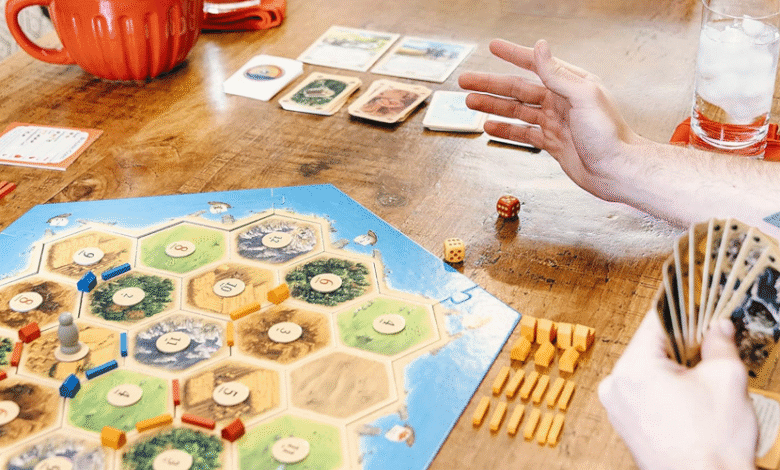Classic Board Games: Timeless Fun for All Ages

Classic board games have stood the test of time, bringing together friends, families, and strangers for hours of entertainment. From the early days of traditional board games to the sophisticated, strategy-based games of today, these games remain a central part of human culture. Whether it’s the thrill of competition, the joy of collaboration, or the cyberkannadig nostalgia of familiar play patterns, board games have an unmatched ability to create connections. I will discuss the world of classic board games and delve into why they remain a source of joy for all ages.
The History of Classic Board Games
The concept of board games dates back thousands of years. Early civilizations, including the Egyptians, Greeks, and Romans, enjoyed games that combined strategy, chance, and social interaction. Some of the most iconic games, such as Chess, Go, and Senet, have survived centuries, continuing to be enjoyed by modern audiences.
Timeline of Classic Board Games
These early games laid the foundation for the development of modern classic board games, which would continue to evolve in complexity and popularity over the centuries.
| Game Name | Origin | Year of Inception | Notable Features |
| Senet | Ancient Egypt | 3100 BCE | Ancient Egyptian board game with dice |
| Chess | India | 6th century CE | Strategy-based game, checkmate rule |
| Go | China | 2nd century BCE | Simple rules, deep strategy |
| Backgammon | Mesopotamia | 3000 BCE | Dice rolling, race game |
| Checkers | Ancient Egypt | 1400 BCE | Simple yet strategic jumping game |
Iconic Classic Board Games
Some games have reached an iconic status due to their simplicity, accessibility, and depth. These classic board games have not only survived through the ages but continue to be loved by new generations.
Iconic Classic Board Games
These timeless games are celebrated not only for their historical significance but also for their ability to engage players in strategic thinking, creative problem-solving, and social interaction.
| Game Name | Year of Release | Players | Genre | Special Features |
| Chess | 6th century CE | 2 | Strategy | Mind sport with deep tactical gameplay |
| Monopoly | 1935 | 2-8 | Economic Strategy | Real estate buying and trading |
| Scrabble | 1938 | 2-4 | Word Game | Build words using letter tiles |
| Clue (Cluedo) | 1949 | 3-6 | Mystery | Solve the mystery of a murder |
| Risk | 1957 | 2-6 | Strategy | World domination through army control |
Why Classic Board Games Remain Popular
Despite the rise of video games and digital entertainment, classic board games continue to be a popular pastime. Why is this the case? The answer lies in the timeless nature of these games, their simplicity, and the way they bring people together.
- Social Interaction: Board games encourage face-to-face interaction. In an age dominated by virtual communication, the physical presence of others while playing a game is highly valued.
- Nostalgia: Many people who grew up with classic board games continue to enjoy them as adults, passing down the experience to younger generations.
- Accessible Gameplay: Unlike video games, classic board games often have simple rules that are easy to pick up, making them accessible to players of all skill levels.
- Strategic Thinking: Classic board games like Chess and Risk require critical thinking, planning, and strategy, which appeal to players who enjoy intellectual challenges.
The Impact of Board Games on Cognitive Development
Playing board games isn’t just fun—it’s also beneficial for cognitive development. Studies have shown that these games can help improve memory, concentration, problem-solving skills, and social interaction.
For example, chess is known for enhancing cognitive abilities like pattern recognition, logical thinking, and foresight. Scrabble improves vocabulary, spelling, and word recall, while games like Monopoly encourage financial literacy and strategic planning.
Modern Variations of Classic Board Games
While the classic versions of these games remain beloved, many have been reimagined with modern twists. New editions often feature updated artwork, themed versions, or enhanced rules to keep the gameplay fresh.
Modern Variations of Classic Board Games
These modern adaptations ensure that the classics continue to attract new audiences, with updated themes and features appealing to both old and new fans.
| Classic Game | Modern Twist | New Features |
| Monopoly | Monopoly: Fortnite Edition | New gameplay mechanics, battle royale theme |
| Scrabble | Scrabble Go (Mobile) | Digital version with multiplayer options |
| Clue | Clue: Harry Potter Edition | Hogwarts-themed mystery-solving |
| Risk | Risk: Game of Thrones Edition | New maps and faction-based gameplay |
| Chess | Chess 960 (Fischer Random Chess) | Randomized starting positions |
The Role of Classic Board Games in Family Bonding
One of the most significant benefits of playing classic board games is their ability to bring families together. Whether it’s a rainy day activity or a holiday tradition, board games offer opportunities for families to bond, share laughs, and create memories.
Games like Monopoly, Scrabble, and Clue are often a staple in family gatherings, encouraging friendly competition and teamwork. Additionally, these games allow parents and children to spend quality time together, without the distractions of digital devices.
The Therapeutic Benefits of Classic Board Games
Board games are more than just a form of entertainment; they also provide therapeutic benefits. For people with certain cognitive disorders, such as Alzheimer’s disease or autism, board games can help improve cognitive function, social interaction, and emotional regulation.
Games like Chess have been used in therapeutic settings to promote concentration and focus. Similarly, cooperative board games, such as Pandemic, help foster teamwork and empathy, encouraging players to work together toward a common goal.
The Evolution of Classic Board Games into Competitive Tournaments
While board games have traditionally been played casually, they have also evolved into competitive arenas. Many classic board games now feature competitive tournaments, with players from all over the world vying for top spots.
The rise of competitive chess, Scrabble, and even Monopoly tournaments has led to the creation of professional leagues, where top players compete for substantial prizes and recognition. These tournaments bring a new level of prestige and excitement to the world of classic board games.
Wrapping Up
Classic board games have proven to be more than just entertainment—they are integral to our social lives, cognitive development, and even our mental well-being. From Chess to Monopoly, these games have adapted and evolved over the centuries, but their core principles of strategic play and social interaction remain unchanged. Whether played casually or in competitive tournaments, classic board games will continue to be a timeless source of enjoyment for all ages, fostering connections and creating memories across generations.
FAQs
Why are classic board games still relevant in today’s digital age?
Despite the prevalence of digital entertainment, classic board games remain relevant because they offer a unique form of social interaction and tangible gameplay experience. In a world dominated by screens, people are seeking real-life connections, and board games provide an ideal way to engage with others. Additionally, the simplicity and ease of access make them a go-to choice for casual fun.
How do board games benefit children’s development?
Board games foster the development of essential skills in children, including problem-solving, critical thinking, and social interaction. Games like Monopoly teach children about money management, while Scrabble enhances vocabulary. Moreover, board games help children develop patience, as they learn to wait for their turn and deal with both winning and losing.
Can classic board games improve relationships?
Yes, playing board games can strengthen relationships by encouraging face-to-face interaction and providing opportunities for cooperation and competition. Games foster teamwork, help resolve conflicts, and build trust, making them an excellent tool for improving communication and emotional connection in relationships.
Are there classic board games that promote teamwork?
Many classic board games, such as Pandemic and Forbidden Island, are cooperative, meaning players work together to achieve a common goal. These games require players to communicate effectively, strategize, and make joint decisions, all of which help foster teamwork and collaboration.
What are the cognitive benefits of playing chess?
Chess is known for its ability to enhance cognitive abilities such as critical thinking, memory, and spatial awareness. Playing chess requires players to think several moves ahead, improving their ability to plan and strategize. It also helps with concentration and problem-solving, skills that are beneficial in both academic and personal life.
How have modern versions of board games changed the experience?
Modern versions of classic board games often incorporate new themes, updated graphics, and revised rules to keep gameplay exciting and fresh. For example, Monopoly: Fortnite Edition introduces new mechanics, such as storm zones and player battles, while Scrabble Go allows players to enjoy the game digitally, enabling easy multiplayer interactions.
Are there board games for adults that offer a deeper strategy experience?
Yes, there are many board games designed specifically for adults that focus on deep strategy and complex decision-making. Games like Catan, Ticket to Ride, and Risk provide intricate gameplay that requires planning, negotiation, and a strategic mindset. These games cater to adult players who enjoy thoughtful challenges and competition.



